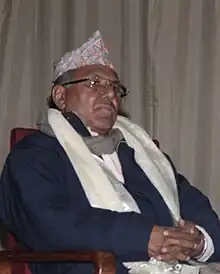Modanath Prasrit | |
|---|---|
| मोदनाथ प्रश्रित | |
 Modanath Prasrit | |
| Born | Modanath Paudel 20 June 1942 |
| Nationality | Nepali |
| Education | Master's Degree (Nepali), Acharya (Ayurveda) |
| Occupation(s) | writer, poet, politician, political activist, social commentator, cultural commentator, Ayurvedic Practitioner |
| Parents |
|
| Awards | Madan Puraskar, 2023 B.S. Ujjwal Kirtimaya Rashtradeep (second class) |
| Writing career | |
| Nickname | Prasrit |
| Notable works | Maanav (Long Poem) Aamaka Aansu (Collection of poems) Devasur Sangram (Epic) Golagharko Sandesh (Long poem) |
| Member of Parliament[1] | |
| In office 1994–1999 | |
| Constituency | Rupandehi Area 3 |
| Minister of Education | |
| In office 2054 BS – 2055 BS | |
| Monarch | Birendra |
| Prime Minister | Man Mohan Adhikari |
| Personal details | |
| Political party | Nepal Communist Party |
| Other political affiliations | CPN-UML (until 2018) Nepali Congress(until 2019 BS) |
Modanath Prasrit, also Modnath Prasrit (Nepali: मोदनाथ प्रश्रित; born 20 June 1942)[1] is a Nepali writer, politician and political activist. A long time member of the Nepali communist movement,[1] he became the Minister of Education[1] in 2054 BS (A.D. none). His writings reflect his communist ideology. His book Devasur Sangram (Translation: War between Gods and Demons) is particularly noted for its challenge to Hindu orthodoxy.
Biography
Prasrit was born Modanath Paudel on 20 June 1942, in Khidim, Arghakhanchi, to Ghanashyam Paudel and Balikadevi.[1] He has Master's degree in Nepali language and a title of 'Acharya' in Ayurvedic Medicine.[1] He was awarded the Madan Puraskar for Nepali literature in 2023 B.S. (1966–67 A.D.) for the epic Maanav. He has continued to publish a prolific list of works in literature and socio-political commentary since then. Prasrit was an important intellectual figure in the Nepali struggle for Democracy during the Panchayat rule.
Political views
Modanath Prasrit is generally considered a "progressive" writer, although some within the movement claim he has joined the "reactionary" camp in recent years.[2] He has surprised many with his stance for reinstating Nepal as a Hindu nation, reverting secularism,[3] while also opining that there was no justification for a Hindu state in the first place.[4] He has also shown a soft spot for traditional Hindu poets like Bhanubhakta Acharya[5]
List of works
He has published a total of 2 epic poems, 2 long poems and 235 poems and songs in total. In addition, he regularly contributes his social, cultural and political commentary on newspapers, magazines, talk shows and conferences.[1]
| Type | Year (BS) | Title |
|---|---|---|
| Collection of poems | 2019 | Aamaka Aansu[1] |
| Long poem | 2020 | Buba khai?[1] |
| Long poem | 2023 | Maanav[1] |
| Epic | 2030 | Devasur Sangram[1] |
| Long poem | 2039 | Golagharko Sandesh[1] |
| Collection of poems | 2039 | Sahidko Ragat[1] |
| Collection of songs | 2049 | Jaba chalchha huri[1] |
| Collection of songs and poems | 2058 | Sankalit Rachana[1] |
Awards
In 2014, he was awarded the Ujjwal Kirtimaya Rashtradeep (second class), a national honour, by a cabinet decision, for his contributions to society.[6]
References
- 1 2 3 4 5 6 7 8 9 10 11 12 13 14 15 "मोदनाथ प्रश्रित : कवि–व्यक्तित्व एवम् कृतित्व एक विश्लेषण" [Modanath Prasrit: Poet-Personality and writings, an analysis]. Samakalin Sahitya (in Nepali).. Retrieved 30 March 2019
- ↑ Chalise, Prastut. "The Career of Bhanubhakta as a History of Nepali National Culture, 1940–1999." Studies in Nepali History and Society (1999): n. pag. Print.
- ↑ Pramod Mishra Not caste in stone – OpEd, The Kathmandu Post. Retrieved 30 March 2019
- ↑ NEPAL RELIGION: The Death Of Vishnu https://www.nchro.org/index.php/2006/05/28/nepal-religion-the-death-of-vishnu/ Retrieved 30 March 2019
- ↑ Prasrit, Modnath. 2056 v.s. Bh¯anubhakta: Jant¯ak¯a l¯agi Avis¯ap ya Bard¯an? Uts¯aha 55: 49–56
- ↑ "Late GP Koirala given highest national honour". The Kathmandu Post. 29 May 2014. Retrieved 12 December 2019.
